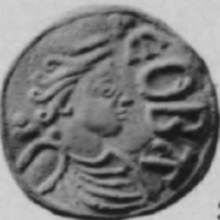- Cynethryth
-
For the 9th century Mercian princess, see Cwenthryth.
Cynethryth Queen of Mercia 
Portrait penny of Cynethryth, minted by Eoba at Canterbury. Cynethryth is the only Anglo-Saxon queen known to have had coins issued in her name and these are unique in Western Europe of the period.[1] Coin held by the British Museum.Died after AD 798 Offspring Ælfflæd
Eadburh
Æthelburh
Æthelswith
Ecgfrith of MerciaCynethryth (Cyneðryð; died after AD 798) was the wife of Offa of Mercia and mother of Ecgfrith of Mercia. Cynethryth is the only Anglo-Saxon Queen consort in whose name coinage was definitely issued.
Contents
Origins and marriage
Nothing certain is known of Cynethryth's origins. Her name recalls the wife and daughters of King Penda—Cynewise, Cyneburh, and Cyneswith—which may indicate that she was a descendant of Penda.[2]
Unlike the relations of Æthelbald, Offa's predecessor, which had been condemned by the church, the marriage of Offa and Cynethryth was entirely conventional and met with the approval of the church hierarchy.[3] In a letter to Cynethryth and Offa's son Ecgfrith, Alcuin advises him to follow the example of his parents, including his mother's piety. Elsewhere Alcuin refers to Cynethryth as "controller of the Royal household".[4]
Queen of the Mercians
The date of Offa and Cynethryth's marriage is not known, but it was not until after the birth of Ecgfrith that Cynethryth began to witness charters.[5] She first witnessed a charter dated 770, along with Ecgfrith and Ælfflæd. By 780 she is Cyneðryð Dei gratia regina Merciorum (Cynethryth, by the Grace of God, Queen of the Mercians).[6]
It has been suggested that Cynethryth's coinage was in emulation of the Byzantine Empress Irene, who ruled during this time through her son, Constantine VI. The imagery employed, however, does not follow that on Irene's coinage, but that used on coins of late Roman empresses, just as the image used on Offa's coins show him as a late Roman emperor.[7] It has been suggested that the coins were minted for donations by Cynethryth to the Church, but their similarity to the general issues suggests otherwise. This coinage is unique in Anglo-Saxon England, and indeed in Western Europe in this period.[1]
Cynethryth is associated with her husband in charters and is said to have been a patron of Chertsey Abbey. Pope Adrian I, when elevating Higbert's Bishopric of Lichfield to an Archbishopric, wrote to Offa and Cynethryth jointly.
Her children with Offa, besides Ecgfrith, included at least four daughters:
- Æthelburh, in later life an abbess
- Eadburh, wife of Beorhtric of Wessex
- Ælfflæd, wife of Æthelred I of Northumbria
- Æthelswith
In the legend of Æthelberht II of East Anglia, a daughter of Offa named Ælfthryth—or Alfrida—appears, but there is no firm evidence for her existence.[8]
Saint Æthelberht
She is said by some later chroniclers, such as Roger of Wendover, to have incited Offa to the killing of Æthelberht, King of East Anglia, at the royal residence of Sutton, near Hereford, or to have had her servants kill him.
Abbess of Cookham
After Offa's death in 796 Cynethryth entered religion. She was abbess of the monastery at Cookham and also had charge of the church at Bedford where her late husband was interred. She was certainly alive in 798 when a dispute over church lands with Æthelhard, Archbishop of Canterbury, was settled at the Synod of Clofesho.
Notes
- ^ a b Williams, p. 216.
- ^ Stafford, p. 36.
- ^ Stafford, p. 37.
- ^ Keynes. Alcuin's letters 61, 62, and 101 mention Cynethryth; Monumenta Germaniae Historica, Epistolae Karolini aevi (II), pp. 105, 106, & 148.
- ^ Stafford, p. 38.
- ^ For a list of charters witnessed by Cynethryth, see the Prosopography of Anglo-Saxon England; for the charters themselves, see the Anglo-Saxon Charters homepage and Dr. Sean Miller's Anglo-Saxons.net.
- ^ Kelly; Keynes; Stafford, pp. 39–40.
- ^ Prosopography of Anglo-Saxon England. The legend is discussed by Thacker, pp. 16–18.
References
- "Cynethryth 2 (Female) Queen of the Mercians, fl. 770-798; wife of Offa 7; abbess of Cookham". Prosopography of Anglo-Saxon England. http://www.pase.ac.uk/jsp/DisplayPerson.jsp?personKey=3911. Retrieved 2007-10-08.
- "Anglo-Saxon Charters homepage". http://www.trin.cam.ac.uk/chartwww/charthome.html. Retrieved 2007-10-08.
- Dümmler, Ernst, Epistolae Karolini aevi, Tomus II. (Monumenta Germaniae Historica, Epistolarum, Tomus IV) Berlin: Weidmann, 1895. (Available at dMGH)
- Kelly, S.E. (2004). "Cynethryth". Oxford Dictionary of National Biography. http://www.oxforddnb.com/index/101054442/. Retrieved 2007-10-08.
- Keynes, Simon, "Cynethryth" in M. Lapidge et al. (eds), The Blackwell Encyclopedia of Anglo-Saxon England. Blackwell, London, 1999. ISBN 0-631-22492-0
- Miller, Sean. "Anglo-Saxons.net". http://www.anglo-saxons.net/. Retrieved 2007-10-08.
- Shippey, Tom (Summer 2001). "Wicked Queens and Cousin Strategies in Beowulf and Elsewhere". The Heroic Age, Volume 5. http://www.mun.ca/mst/heroicage/issues/5/Shippey1.html. Retrieved 2007-10-21.
- Stafford, Pauline, "Political Women in Mercia, Eighth to Early Tenth Centuries" in Michelle P. Brown & Carol A. Farr (eds), Mercia, an Anglo-Saxon kingdom in Europe. Leicester: Leicester University Press, 2001. ISBN 0-8264-7765-8
- Thacker, Alan, "Kings, Saints and Monasteries in pre-Viking Mercia" in Midland History, volume 10 (1985). ISSN 0047-729X
- Williams, Gareth, "Mercian Coinage and Authority" in Michelle P. Brown & Carol A. Farr (eds), Mercia, an Anglo-Saxon kingdom in Europe. Leicester: Leicester University Press, 2001. ISBN 0-8264-7765-8
- Yorke, Barbara, "The Origins of Mercia" in Michelle P. Brown & Carol A. Farr (eds), Mercia, an Anglo-Saxon kingdom in Europe. Leicester: Leicester University Press, 2001. ISBN 0-8264-7765-8
Categories:- 8th-century English people
- 8th-century women
- Anglo-Saxon royal consorts
- Mercian people
Wikimedia Foundation. 2010.

